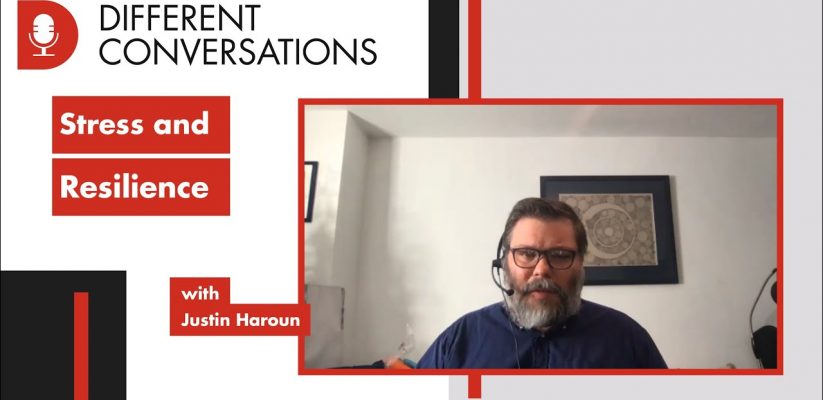Author: Luna Mia Sigle
So, it is that time of the year again. Family gatherings, abundant meals, gift exchanges, colourful lights, festive carols… who invited Covid-19 again? In 2020, we invited Justin Haroun, head of the University of Westminster’s Centre for Resilience, to our Different Conversations Podcast to discuss how to have a Covid-19 Christmas. Although we recorded the episode last year, it is, unfortunately, relevant again. With Omicron, increasing case numbers and restrictions all under constant review, it is hard to know what to expect from this year’s holidays.
From financial worries to work overload, a ‘normal’ Christmas consists of many anxiety-inducing factors. Chief among them is our own expectations. As we see in films, shows and media, there is an idea of ‘the perfect Christmas’ that we all try to achieve. This might include the presence of relatives who are not with us anymore, a volume of presents that is not affordable –neither in money nor time–, or a quantity and quality of food that every year seems to goes wrong. This year, as Haroun mentions in the podcast, we are also fighting against our own physiology. As social beings we crave human interaction, and for many people Christmas is an occasion to get together and spend time with loved ones. As of writing this, we do not know if Coronavirus restrictions might keep us apart from our family or might not allow us to travel back home. Even in the cases where people are able to meet, they might experience a feeling of guilt for exposing their relatives to a dangerous disease. All these circumstances, our desire to change or control them, become stressors.
In situations like this, having a set of skills for resilience can be life-changing. According to Haroun, resilience consists of our ability to prepare, adapt and recover from challenges. We are used, addicted even, to certainty; we need to trust our knowledge, we need to make sense of things. At this moment, we might not know what our Christmas is going to look like, whether we are doing the right thing or not, or if everything is going to go according to plan. How are we supposed to prepare, then? Haroun here suggests that we identify what is within our control and differentiate it from what is not. There is no point in stressing out about things we cannot change, so the best thing we can do is accept them and focus on what we can control.
“All emotions are welcome, but not all emotions are useful”, says Haroun. Stress helps us get things done, but that is not always the case. Being aware of which emotions are helping us and which ones are not serving any purpose is a great mechanism to reduce stress. Whenever you feel overwhelmed, ask yourself if your emotions are of use. If the answer is no, what can you do to let go? Freeing ourselves from emotions that do not help us will take some weight off our shoulders and make our challenges a bit easier.
Besides using our resilience skills, there are also restorative techniques that we can use to deal with stressful situations. Short techniques, Haroun lists, are things like focusing on our breath and practising self-regulation. When we feel stressed, one thing that usually happens is that we start over-breathing or hyperventilating because our body thinks we need to have more energy to battle some physical threat. This triggers a myriad of other “fight-or-flight” physiological responses that will create tension in our body. Simply focusing on our breath can help calm both the body and the mind. Feelings of appreciation and gratitude can also create a positive emotional spiral to disrupt the stress response. Longer techniques involve taking a recovery break or seeking social connection. Taking a walk in nature, going out into daylight or even making a cup of tea and concentrating specifically on what we see, hear or feel can act as a brief pause to our daily stress. Although we might not be able to physically see or hug someone, it is possible to have social connections and deep conversations through technology. Lastly, we all have our own personal techniques to control our stress levels. From cooking a delicious meal to practising meditation, exercise, knitting or journaling, we can find unique restorative activities to reset our minds. As Dr Brad Elliott points out, it is not about distracting, but about refocusing on things that bring us joy and inspiration.
As a last point, Haroun shares with us his feelings towards Christmas: his secret to a not-so-stressful Christmas is living in the present moment. This Christmas might not be what we expected, but if we let it surprise us, it can be as joyful as any other year.
If you would like to watch our amazing colleague talking about Stress and Resilience on our podcast, click on the video above. Don’t forget to subscribe to Different Conversations on YouTube, listen in on iTunes, Spotify or any other channel that suits you best. You can also follow us on Twitter where we share all the most exciting news and updates.
About our guest
Justin Haroun is a Senior Lecturer in the School of Life Sciences at the University of Westminster. He established the Westminster Centre for Resilience, which aims to transform stress and negative patterns into resilience using physiological and behavioural biometrics.

Excelente artículo!